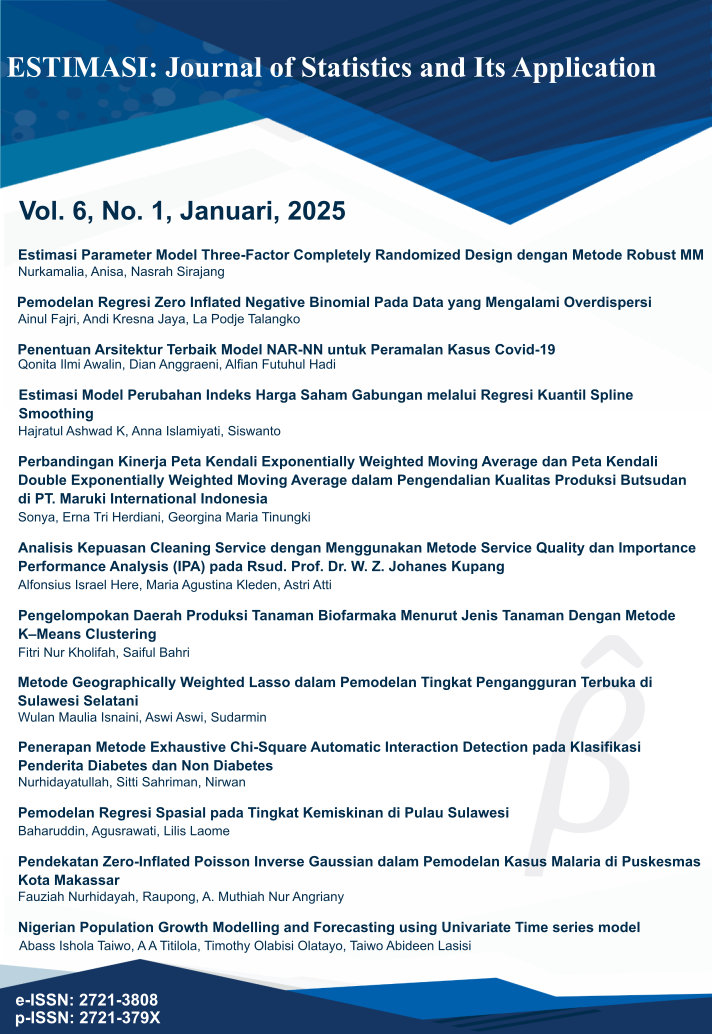Nigerian Population Growth Modelling and Forecasting using Univariate Time series model
DOI:
https://doi.org/10.20956/ejsa.v6i1.34349Keywords:
Population growth, Nigeria, Autoregressive integrated moving average model, ForecastingAbstract
The Nigerian population is growing rapidly, and this poses significant challenge to human existence. To have an insight, Autoregressive Integrated Moving Average (ARIMA) model was used to model and predict population growth. The results showed a yearly population mean of 99,611,692 with a standard deviation of 53,188,740. After estimation, the ARIMA(3,2,1) model was chosen for having lowest Akaike and Schwarz information criterion with the adequacy of the model attained using the Ljung-Box Statistic Autocorrelation and partial autocorrelation functions of the residuals. Coefficient and adjusted coefficient of determinations showed the model has a strong predictive accuracy, with the forecast indicating a continuous population growth increase of over 5 million annually. Conclusively, Nigerian government must plan how to curtail this explosive growth expected at over 418 million by 2050.
References
Harvard International Review Public Health and Overpopulation: The United Nations Takes Action. https://hir.harvard.edu/public-health-and-overpopulation
Chamie, J. Future Challenges. In Population Trends: Humanity in Transition. International Peace Institute, pp. 2–10, 2007. http://www.jstor.org/stable/resrep09597.5
Stuart, B., Wolfgang, L., & Sergei, S. Very Long Range Global Population Scenarios to 2300 and the Implications of Sustained Low Fertility. Demographic Research. 28, 39, 1145-1166, 2013.
West Africa Gateway. Nigeria, 2012.
https://www.oecd.org/swac/publications/Nigeria_e-version_en_light.pdf
The Economist. Africa’s population will double by 2050, 2020.
https://www.economist.com/special-report/2020/03/26/africas-population-will-double-by-2050.
Nigeria Multidimensional Poverty Index. 2022, https://www.nigerianstat.gov.ng/
The Global Economy. Nigeria Economy Indicator, 2023, https://www.theglobaleconomy.com/nigeria/
Nyoni, K. Population Explosion in Nigeria by 2050: Overwhelming Empirical Evidence from the Box-Jenkins Arima Approach. Dimorian Review, 6(2), 15-27, 2019.
Sinding, S. W. Population, poverty and economic development. Philosophical Transaction of Royal Society B, 364(1532), 3023-3030, 2009.
United Nations. Why population growth matters for sustainable development, Online Edition, 2022. https://www.un.org/development/
Dominic A., Oluwatoyin, M. A., & Fagbeminiyi, F. F. The determinants of population growth in Nigeria: a co-integration approach, The International Journal of Humanities and Social Studies, 4(11), 38-44, 2016.
Aliyu A. A., & Amadu, L. Urbanization, cities, and health: The challenges to Nigeria - A review. Annal of African Medicine, 16(4), 149-158, 2017.
Adejumo, O., O. Growth Limits: A Conceptual Analysis for Sustainable Development in Nigeria. SAGE Open, 10(2), 1-12, 2020.
Folorunso, O., Akinwale, A., T. Asiribo, O. E., & Adeyemo, T. A. Population prediction using artificial neural network. African Journal of Mathematics and Computer Science Research, 3(8), 155-162, 2010.
Olatayo, T. O., & Adeboye, N. O. Predicting Population Growth through Births and Deaths Rate in Nigeria. Mathematical Theory and Modeling, 3(1), 13-29, 2013.
Olayiwola, O. M., Lawal. G. O., Amalare, A. A., Agboluaje, S. A., & Fantola, J. O. Modelling Nigeria Population Growth Rate. Journal of Advances in Mathematics 10(6), 72-81, 2015.
Aidi, H. O., Emecheta, C., & Ngwudiobu, I. M. Population Dynamics and Economic Growth in Nigeria. Journal of Economics and Sustainable Development, 7(15), 16-24, 2016.
Agog, N. S., Bako, S. S., Bamanga, M. A., Peter, M., & Byeli, U. On Logistic Growth Model for Forecasting Nigeria’s Population. Science World Journal, 15(4), 112-115, 2020.
Odimientimi, A., Nnamdi, E., Omokri, A., & Adigwe, A. A Comparative Study of Some Time Series Models on the Population of Nigeria. Global Scientific Journals, 9, 2454-2465, 2021.
Lasisi, T. A., Oladimeji, O. A., & Ogunbanwo, T. S. Detection of Appropriate Model for Nigeria Population Growth Using Root Mean Square Error (Rmse). Researcher, 13(11), 35-42, 2021.
Ogunjobi, E. O., Odusina, M. T., & Adeoti, O. A. Population Growth Model to Project Human Population in Nigeria. African Scholars Journal of Science Innovation and Technology Research, 24(9), 89-98, 2022.
Oladimeji, O. A., Akomolafe, A. A., Lasisi, T. A., Ojo, T. O., Adesina, O. A., & Egbedokun, G. O. Detection of Appropriate Model for Nigeria Population Growth Using Root Mean Square Error (RMSE). International Journal of Systems Science and Applied Mathematics, 7(3), 46-51, 2022.
Orukpe, A., Imianvan, A., & Akazue, M. A. A Comparative Model for Predicting Population Census in Nigeria. International Journal of Computer Applications, 185(26), 27-30, 2023.
Olatayo, T. O., Taiwo, A. I., & Lasisi, T. A. Population prediction modelling with autoregressive integrated moving average (ARIMA) model. Journal of the Nigerian Association of Mathematical Physics, 27(7), 189-200, 2014.
Downloads
Published
Issue
Section
License
Copyright
It is the author's responsibility to ensure that his or her submitted work does not infringe any existing copyright. Authors should obtain permission to reproduce or adapt copyrighted material and provide evidence of approval upon submitting the final version of a manuscript.


